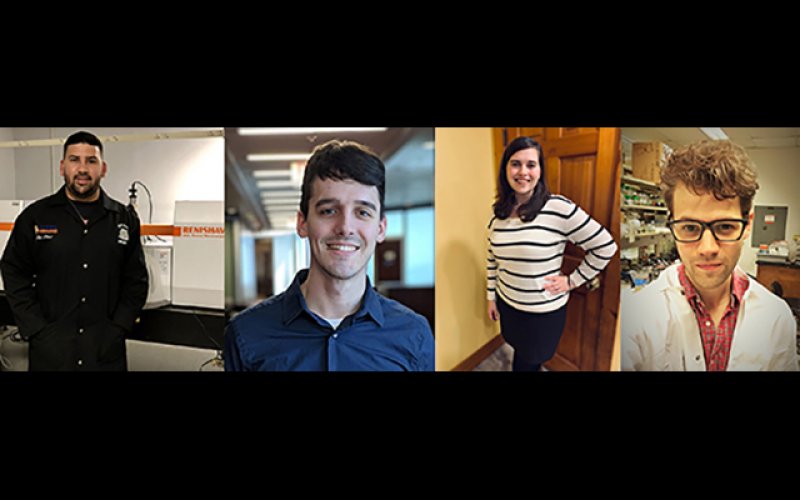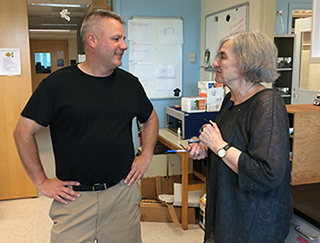Training Program in RNA Sciences Continues Growing in its 6th Year

Four of the 15 PhD students that are new to the RNA Institute Fellows Program: left to right, Luis Perez Almodovar, Tristen Head, Rachel Fay and Ryan Treen.
ALBANY, N.Y. (Oct, 6, 2020) — Attracted by the chance to delve deep into RNA science and enhance career prospects, young PhD-level researchers continue to pursue The RNA Institute’s Fellows Program at record levels.
The 15 new fellows in the program’s sixth year tops the previous high of 12 from a year ago. It was then that the program received a five-year $1.114 million training grant from the National Institutes of Health to build on its goal of fostering future science leaders exploring RNA pathways to better health and the treatment and eradication of diseases.
“We continued to strengthen our RNA Fellows program this year with a new cohort of impressive students,” said Thomas Begley, professor in Biological Sciences and program co-director. “They are an outstanding group, with diverse backgrounds and exciting RNA-based thesis projects.”
Co-director Marlene Belfort, biologist and distinguished professor, said there is a camaraderie, not only between returning fellows and the new, but with alumni of the program as well. “Once a fellow, always a fellow,” she said. “Past cohorts maintain strong ties and participate in seminars, colloquia and networking events. So we can have as many as 40 RNA fellows at any one time!”
Well-Rounded Plan of Study
Since July 1, the fellows have been at work in the labs of UAlbany and SUNY Poly scientists while immersing themselves in an RNA-centric curriculum of courses and colloquia in one of three University departments — Biological Sciences, Biomedical Sciences or Chemistry — or the PhD program in nanobioscience at SUNY Poly. The program this year, said Begley, contains “updated programming, seminars from around the country and exciting research.”
 |
|
RNA Fellows Program co-directors Thomas Begley and Marlene Belfort have a discussion in 2019 in the Institute's laboratories. |
Optional tracks were created in 2019 that allow fellows to increase their entrepreneurship skills and achieve writing excellence through programs with Innovate 518 and the New York State Writers Institute, respectively. Begley considers such collaborations one of the program’s true strengths.
“In addition, our continued partnership with SUNY Polytechnic provides a unique engineering expertise for our science-based program” he said. “Together, faculty from the College of Arts and Sciences, School of Public Health and SUNY Poly provide students with a unique experience, launching recent graduates into biotech, pharmaceutical and academic jobs.”
Fellows Express Appreciation
This intensive RNA science experience, using the state-of-the-art facilities of the Life Sciences Building and SUNY Poly while providing students with a comprehensive access to faculty, techniques and collaborations, is one of the benefits that RNA fellows have appreciated since the program’s beginnings in 2015. This year’s cohort seems no exception.
“I applied for this program because it offers incredible tools for my development as a professional and a researcher,” said Luis Perez Almodovar, who works in the analytical chemistry lab of Professor Igor Lednev. “In this program, you can also meet other people who work in different fields and topics, so I consider this to be an excellent opportunity to develop my scientist career.”
Tristen Head, a member of the nanobioscience lab of Nathaniel Cady, applied to the Fellows program to supplement his education in the nanoengineering program at SUNY Poly and to inform his doctoral research in drug delivery. “The RNA fellowship is a fantastic opportunity to dive deep into RNA biology and gain theoretical and experimental knowledge within a network of leading researchers," he said.
Rachel Fay, who studies biomedical sciences with Alexander Ciota, appreciates the variety of RNA fields represented by both students and faculty. “I applied to the RNA fellowship because I was interested in opportunities to converse with peers from other PhD programs,” she said. “Although I am a student studying virology, the RNA courses offered have demonstrated how interconnected research can be.”
Ryan Treen, who works in the biomedical sciences lab of Anil Ojha, said “the enhanced training that will make me more a competitive job applicant in the future, as well as exposure to careers I would not have otherwise considered” exceeded his expectations. He added he especially values the new career possibilities offered by the entrepreneurship tract.
This fall’s new RNA Fellows, with their PhD fields and the faculty whose labs they work in, are:
- Amir Agharezaee (Chemistry, Maksim Royzen)
- Luis Perez Almodovar (Chemistry, Igor Lednev)
- Phenoah Badu (Biology, Cara Pager)
- Sara Evke (Nanobiosciences, J. Andres Melendez and Thomas Begley)
- Rachel Fay (Biomedical Sciences, Alexander Ciota)
- William Gasperi (Biology, Thomas Begley)
- Tristen Head (Nanobiosciences, Nathaniel Cady)
- Mahera Kachwala (Chemistry, Mehmet Yigit)
- Raghu Katreddi (Biological Sciences, Paolo Forni)
- Noor Kobt (Biomedical Sciences, Prashanth Rangan Rangan)
- Avinash Londhe (Nanobiosciences, Ben Boivin)
- Christopher Smith (Chemistry, Mehmet Yigit)
- Ed Zandro Taroc (Biology, Paolo Forni)
- Ryan Treen (Biomedical Sciences, Anil Ojha)
- Dana Woodstock (Biology, Sammons)




